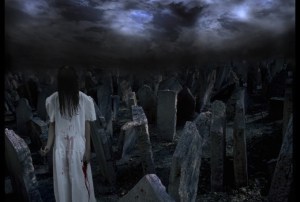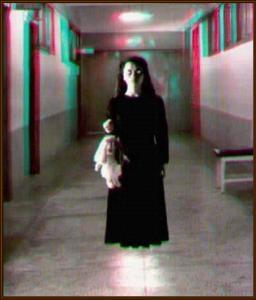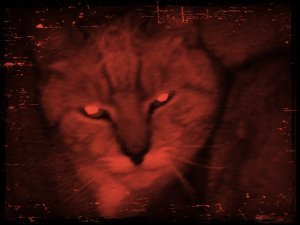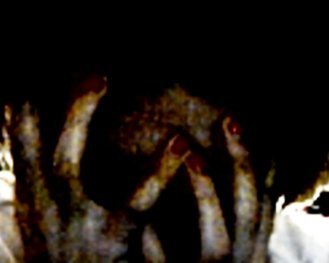Ned Hayes's Blog, page 7
January 21, 2019
MLK Day: A Langston Hughes Poem
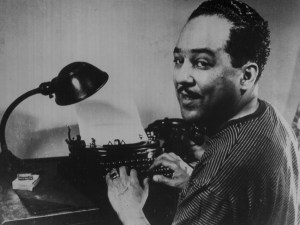 The poet Langston Hughes was a great inspiration to Dr. Martin Luther King Jr. Examples of their connection are expansive. In 1956, King recited Hughes’ poem “Mother to Son” from the pulpit to honor his wife Coretta, who was celebrating her first Mother’s Day. That same year, Hughes wrote a poem about Dr. King and the bus boycott titled “Brotherly Love.” At the time, Hughes was much more famous than King, who was honored to have become a subject for the poet. To honor MLK’s legacy today, here’s Langston Hughes’s famous poem “I, Too.”
The poet Langston Hughes was a great inspiration to Dr. Martin Luther King Jr. Examples of their connection are expansive. In 1956, King recited Hughes’ poem “Mother to Son” from the pulpit to honor his wife Coretta, who was celebrating her first Mother’s Day. That same year, Hughes wrote a poem about Dr. King and the bus boycott titled “Brotherly Love.” At the time, Hughes was much more famous than King, who was honored to have become a subject for the poet. To honor MLK’s legacy today, here’s Langston Hughes’s famous poem “I, Too.”
I, Too
BY LANGSTON HUGHES
I, too, sing America.
I am the darker brother.
They send me to eat in the kitchen
When company comes,
But I laugh,
And eat well,
And grow strong.
Tomorrow,
I’ll be at the table
When company comes.
Nobody’ll dare
Say to me,
“Eat in the kitchen,”
Then.
Besides,
They’ll see how beautiful I am
And be ashamed—
I, too, am America.
Langston Hughes, “I, Too” from Collected Poems. Copyright © 1994 by The Estate of Langston Hughes. Reprinted with the permission of Harold Ober Associates Incorporated.
Source: The Collected Poems of Langston Hughes (Vintage Books, 2004)
MLK Day: A Langston Hughes Poem was originally published on Ned Hayes
January 20, 2019
Secret Chapter #1: Jasper Hunter -- The Rocket
The Real World of Jasper Hunter
 || READ more about the forthconming novel
|| READ more about the forthconming novel
The Real World of Jasper Hunter >>
Sunlight seeps out of the edge of the dark sky and leaks across the Black Rock Desert. Everywhere the light touches turns white, the heat of the day taking over the ground. I’ve never watched the sun enter the sky before, and it is an astonishing thing to see: colors rise with the sun, blossoming out of its slow ascendance. Oranges, purples, yellows and deep reds. They are oscillating out of its orbit slowly, and if I speed it up in my memory, I realize that they are like waves emerging from a rock thrown into deep water. The colors emerge into the sky, wavering out of the bright circle of light at the center of the horizon. It is the most beautiful thing I’ve ever seen. This is a sunrise: my first one. I wonder if they have anything like this in the Real World®, behind the goggles where Jamie spent most of her life.
Serenity, the launch vehicle I named for a spacecraft on an old TV show, rests like an immense skyscraper-sized spear on the makeshift launch pad of the Black Rock Desert hardpan. Bright LED work lights and fast-moving drones have circled its position, making minute adjustments all night long. They cluster and buzz around it, blinking fireflies that fade in the dawn light. The enormous bulk of the thing can only be seen in relief, shadow against shadow, the blinking lights illuminating just one panel, and then another. We’ve worked through the hours of darkness, and our labor is almost complete, just in time for sunrise. 6:17 a.m. is the launch window target time that Jamie chose those many months ago, back when I was in Los Angeles, before we stole this spacecraft from NASA, along with all the components that will launch it into space. 5:47 a.m. is sunrise this time of year here in northern California. So it’s less than half an hour to launch.
The highest spike on the spacecraft – the tracking navigational antennae – is the first piece to be touched by sunlight on this morning. The bright line of light creeps like liquid across the desert floor. The dark spar of the antennae on the spacecraft switches from black shadow into glowing light in a heartbeat. Then the metal of the body of the spacecraft starts reflecting the light. It becomes as bright as a sparkling mirror. Below that glowing spark of antennae, the launch gantry around Serenity remains a colossal darkness against other darkness, the shadow it is beginning to cast reaching all the way out to me, as I move gradually back further to the safe zone beyond the launch site. The sun is still rising, shades wavering out across the sky, an expanding tidal zone of color.
I can’t watch every variation that emerges from the rising sun, and I can’t pay attention to what the spacecraft looks like in the sunlight. I am too busy: I am directing powered drones to double-check cables, ensure complete seals on the craft, remove the loading gantry for Jamie, shield our components from the coming blast. But every now and then I turn and peer at the rising sunlight and see the light sliding across the desert towards the launch site. I do know that when the sunlight arrives, we’ll be within moments of the launch window. We’re almost ready: I’ve been working on this for weeks before Jamie arrived, and by the time I went and got her in Arizona, the spacecraft was nearly ready.
The sight of Serenity now fills me with hope, and with unexpected sadness. I am surprised we have arrived so quickly at the culmination of our plan. Jamie had a plan, and I followed it precisely. I thought I’d go with her, but that was not to be. I am now a rocket launch engineer, the ground control supervisor. Not a spaceman. I would have been an astronaut, but perhaps there’s another time, in the future, when I can do that. For now, Jamie needs me on the ground: she needs me to do the count-down.
Jamie is already loaded in Serenity. Where she is sitting in her cockpit looks like a tiny bubble of metal and glass attached to a gigantic edifice of fuel-filled tanks. She’s strapped in securely to her astronaut seat, resting on top of a gigantic eruption waiting only for a spark. And the companions she has at the top of this great stack of explosive fuel is her AI and a pair of powered walking drones, who can temporarily run the cockpit in case of a necessary course change.
Moments later, sunlight entirely covers Black Rock Desert. It has become a vast pool of brightness: the white desert light fills every pixel I can see. Every color is now burned away by the brilliant sun. This is the moment we’ve been waiting for. I put the dark goggles on, to protect my nearly useless eyes from the bright blast, but also now to protect me from the glowing sunlight. I run a final count-down. I report the results to the cockpit. There’s no response from Jamie. All is well. I run them again, double-check my location, nearly a half-mile back from the launch site. I lift the protective cover over the final connection and press the button. An electronic countdown runs through rapid numbers, blinking down, and nothing happens for a long breath.
Ignition. First, there is a whispering hiss that fills the desert like the light itself is speaking. Like ancient words spoke too fast together to understand: a final incantation. The vast sizzle of sound builds a terrible anticipation. Then I see smoke or steam bursting out of the bottom of the spacecraft as the compressed liquid bursts into flame. There is a reverberating rumble that feels at first as if it emerged from the distant mountains. The rumbling grows like distant thunder. My teeth begin to chatter from the vibrations of the sound, and now I can see fire underneath the rocket body, white and orange jetting out as if from a titanic blast furnace.
My heart thumps terribly now, because I remember the last rocket we built, the one that blew up at the Rose Bowl in Pasadena and lit the houses on fire. It looked just like this before it blew to smithereens. The hissing of the fuel, the rumble of the ignition, the billows of blazing cloud underneath its body. It stood there, on its tail of explosion for a long moment just before the fire shot upward and the cockpit burst apart as the rocket skin became a million shards of blasted metal. That was Jamie’s fault, that time.
I can feel my pulse in my temples, in my throat, nearly bursting out of my chest, as I wait again for that terrible explosion. Thump, thump, thump. My heartbeat seems in sync with the billowing flames.
Nothing is moving. The rocket does not seem to be moving an inch upward. We have failed once more. This time, the failure will all be on me. Jamie didn’t work on the final preparations, Jamie didn’t do the final check or the final countdown. Thump, thump, thump. And the sound still seems like a distant hiss to me, the hissing out of all my hopes and dreams to leave the Real World® behind forever.
Then just between one heartbeat and the next, the ground shakes dreadfully. The world is caving in around me. Like the loudest thunderclap I could ever imagine, rising louder and louder until I throw my hands over the safety ear protection, holding it even tighter to my head, hoping my head won’t burst apart from the terror of the blast. It is as if the earth is opening up underneath me, the sky itself splitting apart from the light and the sound. My teeth meet and chatter at the sound, my jaw aching with the continuous booms of the explosions. The cloud is growing higher and brighter.
But then as I watch, the billows of flame and dust grow immensely larger, obscuring the rocket and the launch vehicle itself, and then I can see the tip of the rocket sticking up above the cloud, and then more of it is showing, and then I realize that the rocket is lifting off the ground, and that’s why I can see more of it now. The dark skyscraper on the launch pad rises into the air on a bright tower of flame.
Suddenly there is a great whooshing sound as the rocket lifts entirely out of the cloud of flaming gas and debris and for a split second, it is almost as if it is resting on top of that cloud, just waiting there, and then almost faster than my eyes can track it, it is farther up in the sky, and then farther up, moving faster and faster, and then it punches through a small white cloud I had not even realized was there, and then I can see it far above me, a faint silver pencil with a jet of flame shooting continuously out of its tail. I blink and stare upwards.
Around me, the entire launch site fills with billows of blowing powder and white smoke. The world is covered in ashy dusty, it blows past me, a sandy cloud rushing as hard as a hurricane. I shut my eyes behind the goggles, feeling the grit scrape past my face, impact my coverall with a million tiny projectiles.
And then I realize I need to pay attention to the trajectory, and I run back to my screen and my remote control launch control board. Back at the control board, a half mile away from the site, the dust has lessened and I can see again. On the screen, I can watch the computer plotting the rocket ship’s path as a series of dots and then a line, and it is perfect, exactly perfect. I can also see the image of the rocket from the remote-control telescope I had installed on the side of the mountain across the playa, that is tracking the vehicle and the rocket. I can see it there, a svelte silver thing that moves in and out of focus as the telescope attempts to hold onto its image and moves with it. The telescope is unevenly adjusted though, so it jerks back and forth, finding it in its trajectory.
Yet the rocket is on path, it has not deviated from the planned trajectory, even with the small cloud, and even with me not paying attention. It is going to follow its instructions perfect. And only I know its instruction set.
It is a similar instruction set to that I created when I sent the deer’s body back into the woods. I wrote a series of instructions and variables that could be summarized as “Don’t stop moving until something stops you.” If we achieve upper atmosphere, and then space, this rocket and its payload will not go into orbit around the earth. Instead, this rocket will continue blasting out to the perigee, and then – with any luck – will push past the gravitational pull of the moon. And then will blast into the solar system itself, into the solar wind, before it has exhausted all primary rocket fuel. However, I retained some small thruster propellant, so that I can maneuver through the solar system. Because I want this launch vehicle with Jamie in it, to break out of the narrow confines of our solar system, and explore the galaxy. I want it to be free of all our constraints, even the gravity of our sun.
I stare down at my monitor, my sight dimmed and uncertain, still wavering with the after-image of the glowing tower of flame. The rocket seems to be on a proper trajectory. But when I glance upward, the tiny dot of flame seems to be arching overhead. I stop looking at the black and green lights on my monitor and just stare upward at the departing Serenity. For a long time the rocket remains visible, a star against the faint clouds. It is like a bright planet moving across the sky, winking out of sight in the dim early dawn, fading into the interstellar objects that surround it.
“Apogee – earth parking orbit achieved,” comes an automated report from the rocket twenty-nine minutes later. The sound echoes in my headset. It is Jamie’s recorded voice, and I know I’ll never hear her voice again. “Releasing first tank, commencing fire for second tank.”
Serenity has achieved first stage. We’ve launched a rocket into orbit. Now we’re going to leave the Earth forever. I never thought it would be possible to leave the Real World® behind, but now Jamie and I have done it.
Want to read MORE from the forthcoming novel?
Sign up for updates about << The Real World of Jasper Hunter >>
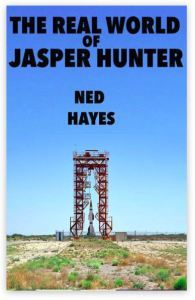
Secret Chapter #1: Jasper Hunter — The Rocket was originally published on Ned Hayes
In Memory of Mary Oliver
 Poet Mary Oliver died last week, at the age of 83.
Poet Mary Oliver died last week, at the age of 83.
Here is one of her poems in memory of her life.
My Work is Loving the World
–by Mary Oliver (Aug 15, 2016)
My work is loving the world.
Here the sunflowers, there the hummingbird –
equal seekers of sweetness.
Here the quickening yeast; there the blue plums.
Here the clam deep in the speckled sand.
Are my boots old? Is my coat torn?
Am I no longer young and still not half-perfect? Let me
keep my mind on what matters,
which is my work,
which is mostly standing still and learning to be astonished.
The phoebe, the delphinium.
The sheep in the pasture, and the pasture.
Which is mostly rejoicing, since all ingredients are here,
Which is gratitude, to be given a mind and a heart
and these body-clothes,
a mouth with which to give shouts of joy
to the moth and the wren, to the sleepy dug-up clam,
telling them all, over and over, how it is
that we live forever.
This is the first poem in Mary Oliver‘s collection Thirst , titled, “The Messenger.”

[Read more Poetry Posts]
In Memory of Mary Oliver was originally published on Ned Hayes
January 17, 2019
In Memory of Mary Oliver
 Poet Mary Oliver died today, at the age of 83.
Poet Mary Oliver died today, at the age of 83.
Here is one of her poems in memory of her life.
My Work is Loving the World
–by Mary Oliver (Aug 15, 2016)
My work is loving the world.
Here the sunflowers, there the hummingbird –
equal seekers of sweetness.
Here the quickening yeast; there the blue plums.
Here the clam deep in the speckled sand.
Are my boots old? Is my coat torn?
Am I no longer young and still not half-perfect? Let me
keep my mind on what matters,
which is my work,
which is mostly standing still and learning to be astonished.
The phoebe, the delphinium.
The sheep in the pasture, and the pasture.
Which is mostly rejoicing, since all ingredients are here,
Which is gratitude, to be given a mind and a heart
and these body-clothes,
a mouth with which to give shouts of joy
to the moth and the wren, to the sleepy dug-up clam,
telling them all, over and over, how it is
that we live forever.
This is the first poem in Mary Oliver‘s collection Thirst , titled, “The Messenger.”

[Read more Poetry Posts]
In Memory of Mary Oliver was originally published on Ned Hayes
January 9, 2019
Book Recommendation: If We Were Villains, by M.L. Rio
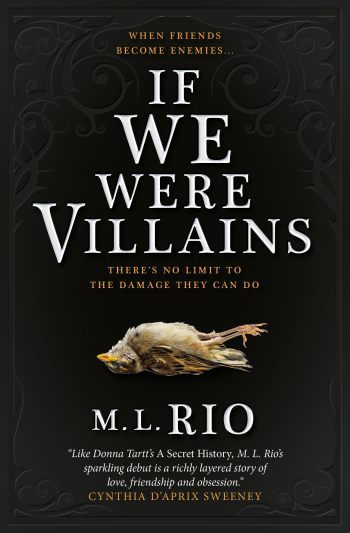 The wonderful fantasy writer V.S. Schwab recently asked for recommendations on books from her readers.
The wonderful fantasy writer V.S. Schwab recently asked for recommendations on books from her readers.
I was surprised to see a new book I’d never heard of mentioned by many — If We Were Villains, by M.L. Rio.
I promptly purchased the book and it’s been my happiest book find, and the first book I finished in 2019! Reminiscent of Donna Tartt’s classic The Secret History and replete with bookish clues, like The Rule of Four (Ian Caldwell and Dustin Thomasen),
Villains tells the story of four Shakespeare-obsessed undergraduates who find themselves obsessed and murderous and in a desperate hunt to find a murderer in their midst. Like any great Shakespearean tragedy, this novel haunts for a long time, and I absolutely loved the book.
This is my January book recommendation!
Book Recommendation: If We Were Villains, by M.L. Rio was originally published on Ned Hayes
November 18, 2018
A New Foreword - Commemorative Edition of The Eagle Tree
I’m excited to announce that Steve Silberman, friend of Oliver Sacks, winner of the Samuel Johnson Prize for Non-Fiction, and author of the New York Times bestselling history of autism Neurotribes, has written a lovely heartfelt foreword for the new hardcover commemorative edition of The Eagle Tree.
FOREWORD
It is the special, magical quality of some precious books that they seem to contain the whole universe in miniature. Ned Hayes’s The Eagle Tree is such a book. By fully inhabiting the subjective experience of his narrator—Peter March Wong, an insatiably curious autistic teenager in Washington State with an unruly passion for climbing trees—Hayes brings vast worlds into focus, from the intricate web of interspecies relationships that is the foundation of the ecology of the Pacific Northwest to the confusing network of interpersonal relationships that March must learn to navigate as he comes of age. Accompanying him on his thrilling and perilous journey toward independence, we not only learn much about the majestic arboreal presences whose “true names” he repeats like a holy litany, we discover that diversity in communities of human minds is as valuable as diversity in communities of living things.
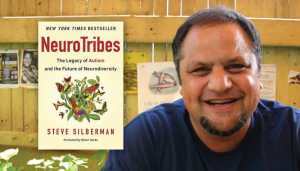 Creating a credible, complexly human disabled narrator can be tricky for a nondisabled author, but Hayes’s years of mentoring and listening to students on the spectrum as a teacher have served him well. He brings us along on March’s atypical hero’s journey without resorting to the usual pity-evoking clichés that afflict most writing about disabled people in general and about people on the autism spectrum in particular.
Creating a credible, complexly human disabled narrator can be tricky for a nondisabled author, but Hayes’s years of mentoring and listening to students on the spectrum as a teacher have served him well. He brings us along on March’s atypical hero’s journey without resorting to the usual pity-evoking clichés that afflict most writing about disabled people in general and about people on the autism spectrum in particular.
March is not presented as a hapless, bumbling, trivia-obsessed Aspie who tramples social norms to comedic effect; nor is he caricatured as a saintly savant who exists primarily to solve the problems of nondisabled characters. Instead, Hayes presents March as very much his own person, avidly pursuing his quest to acquire knowledge about the trees he loves, even in the face of obstacles introduced by adults who feel confident that they’re acting with his best interests in mind. Rather than framing March as the unreliable narrator of his own story, Hayes probes the ways that March’s unusual mind enables him to be an exceptionally reliable narrator of aspects of experience that most “normal” people miss.
Furthermore, it is only in the past couple of decades that the autism diagnosis has become available to teenagers and adults, and thus only recently that autobiographical accounts of lives on the spectrum have become available to readers. In addition to listening to his students, Hayes has clearly absorbed the work of autistic writers like industrial designer Temple Grandin, which enables him to illuminate his narrator’s thought processes from the inside with the intimacy and veracity of lived experience.
But March is more than an embodiment of his disability, and there’s more at stake in The Eagle Tree than the coming-of-age of a single young man. The overarching context of his journey is the tenuous fate of the imperiled ecosystem in which he finds himself. March’s identification with trees—particularly with the regal Ponderosa pine that becomes the primary focus of his tree-climbing desire and gives the book its title—is so all-consuming that he comes to resemble a teenage Walt Whitman, seeking communion with the magnificent ancient beings that tower over his landscape. In Whitman’s era, however, there was no reason to believe that the resilient natural world that the good gray poet praised in poems like “This Compost” would fail to thrive into the far future. By contrast, in our own time, the old-growth forests that once blanketed the Pacific Northwest have been nearly erased from the map. Nearly inadvertently, March’s love of trees leads him to become their champion at a moment when they most need one.
In some First Nations societies, people with cognitive differences were accorded special status as shamans who acted as interlocutors between the living and the dead, or between the realm of humans and the realm of animals. One reason that Hayes’s tale resonates with uncanny familiarity is that it taps into archetypal springs of meaning in old-growth layers of consciousness—the substrate of fairy tales and dreams. At the same time, March’s quest to learn as much as he can about the trees he loves leads him deep into the study of the science of living systems. While people like him are often described by clinicians as having “limited” or “obsessive” interests, March’s intense focus on a single tree becomes a lens through which the machinery that sustains the whole planet becomes visible.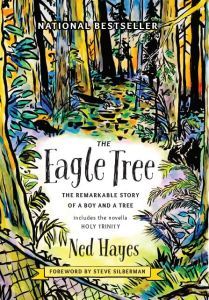
“I would like to think the trees and I have something in common,” March says to himself near the end of this enchanting book. Perhaps a better word than independence for what he achieves in the course of his journey is interdependence: the knowledge that every living being is connected to every other living being through an intricate web of relationships that are often hidden from the casual observer. It is one of the marvelous paradoxes of the human condition that we often discover who we are only by loving someone else. By giving the Eagle Tree his full attention, March glimpses his place in the order of all things.
A New Foreword – Commemorative Edition of The Eagle Tree was originally published on Ned Hayes
October 31, 2018
New Tana French Book Review
Tana French is one of the most talented writers I’ve ever read in the mystery and detective genre. In this most recent book, she really surpasses the genre entirely, and breaks new ground with a lyrical, heartbreaking and soul-bending literary novel that focuses on one man’s gradual descent out of privilege and extreme good luck into the netherworld of uncertain fortunes and dissolution.
This is not a story of a person’s willful decline — far from it — but instead, the battle to retain esteem in a universe where bad luck happens and you have to make up a life out of the remaining scraps. Sure, each of her novels have a death in them, but this novel focuses on character building above all, and brings to the forefront her excellent skill with language, with insight and with skillful observation of human nature.
This is, in a word, Tana French’s best book, and I would not be surprised at all to see her work in future years held up as examples of leading literature. Jane Austen, after all, wrote romances, while Charles Dickens wrote fabulist fictions.
Tana French writes great novels.
New Tana French Book Review was originally published on Ned Hayes
October 18, 2018
Halloween: Twelve Terrifying Two Sentence Horror Stories
I found a thread on Reddit that asked this question: “What is the best horror story you can come up with in two sentences?” I posted the best ones I found, as well as one more scary tale I created on my own. See if you can figure out which one is mine! With Halloween right around the corner, these two-sentence terrors fit the month perfectly!
Happy Halloween!
1.
“My daughter won’t stop crying and screaming in the middle of the night. I visit her grave and ask her to stop, but it doesn’t help.”
Image Credit: Fivvr
2.
I woke up to hear knocking on glass. At first, I thought it was the window until I heard it come from the mirror again.
Image Credit: Vampyr Fangs
3.
I can’t move, breathe, speak or hear and it’s so dark all the time. If I knew it would be this lonely, I would have been cremated instead.
Image Credit: Public Domain
4.
After working a hard day, I came home to see my girlfriend cradling our child. I didn’t know which was more frightening, seeing my dead girlfriend and stillborn child, or knowing that someone broke into my apartment to place them there.
Image Credit: Dead Girl (film)
5.
My sister says that mommy killed her. Mommy says that I don’t have a sister.
Image Credit: Universal
6.
“I can’t sleep,” she whispered, crawling into bed with me. I woke up cold, clutching the dress she was buried in.
Image Credit: Cemetery Guide
7.
I begin tucking him into bed and he tells me, “Daddy, check for monsters under my bed.” I look underneath for his amusement and see him, another him, under the bed, staring back at me quivering and whispering, “Daddy, there’s somebody on my bed.”
Image Credit: Flickr
8.
A girl heard her mom yell her name from downstairs, so she got up and started to head down. As she got to the stairs, her mom pulled her into her room and said, “Don’t go, honey — I heard that, too.”
Image Credit: Random Geekings
9.

Yesterday, my parents told me I was too old for an imaginary friend and I had to let her go. They found her body this morning.
Image Credit: DeviantArt
10.
In the early morning, I could feel the cat purring against my side, nestled up against me in bed, but the cat smelled of blood. I woke slowly remembering that I had tortured that cat to death last Sunday, and scattered the body parts across the construction site.
Image Credit: DeviantArt
11.
The last thing I saw was my alarm clock flashing 12:07 before she pushed her long rotting nails through my chest, her other hand muffling my screams. I sat bolt upright, relieved it was only a dream, but as I saw my alarm clock read 12:06, I heard my closet door creak open.
Image Credit: DeviantArt
12.
The doctors told the amputee he might experience a phantom limb from time to time. Nobody prepared him for the moments though, when he felt cold fingers brush across his phantom hand.
Image Credit: MNN
Nicholas Hallum created a short and chilling tale.
You can ORDER for Kindle here >>
Thank you for your reading and support!
Halloween: Twelve Terrifying Two Sentence Horror Stories was originally published on Ned Hayes
October 11, 2018
Poem: American Journal
Robert Hayden, 1913 – 1980
here among them the americans this baffling
multi people extremes and variegations their
noise restlessness their almost frightening
energy how best describe these aliens in my
reports to The Counselors
disguise myself in order to study them unobserved
adapting their varied pigmentations white black
red brown yellow the imprecise and strangering
distinctions by which they live by which they
justify their cruelties to one another
charming savages enlightened primitives brash
new comers lately sprung up in our galaxy how
describe them do they indeed know what or who
they are do not seem to yet no other beings
in the universe make more extravagant claims
for their importance and identity
like us they have created a veritable populace
of machines that serve and soothe and pamper
and entertain we have seen their flags and
foot prints on the moon also the intricate
rubbish left behind a wastefully ingenious
people many it appears worship the Unknowable
Essence the same for them as for us but are
more faithful to their machine made gods
technologists their shamans
oceans deserts mountains grain fields canyons
forests variousness of landscapes weathers
sun light moon light as at home much here is
beautiful dream like vistas reminding me of
home item have seen the rock place known
as garden of the gods and sacred to the first
indigenes red monoliths of home despite
the tensions i breath in i am attracted to
the vigorous americans disturbing sensuous
appeal of so many never to be admitted
something they call the american dream sure
we still believe in it i guess an earth man
in the tavern said irregardless of the some
times night mare facts we always try to double
talk our way around and its okay the dreams
okay and means whats good could be a damn sight
better means every body in the good old u s a
should have the chance to get ahead or at least
should have three squares a day as for myself
i do okay not crying hunger with a loaf of
bread tucked under my arm you understand i
fear one does not clearly follow i replied
notice you got a funny accent pal like where
you from he asked far from here i mumbled
he stared hard i left
must be more careful item learn to use okay
their pass word okay
crowds gathering in the streets today for some
reason obscure to me noise and violent motion
repulsive physical contact sentinels pigs
i heard them called with flailing clubs rage
and bleeding and frenzy and screaming machines
wailing unbearable decibels i fled lest
vibrations of the brutal scene do further harm
to my metabolism already over taxed
The Counselors would never permit such barbarous
confusion they know what is best for our sereni
ty we are an ancient race and have outgrown
illusions cherished here item their vaunted
liberty no body pushes me around i have heard
them say land of the free they sing what do
they fear mistrust betray more than the freedom
they boast of in their ignorant pride have seen
the squalid ghettoes in their violent cities
paradox on paradox how have the americans
managed to survive
parades fireworks displays video spectacles
much grandiloquence much buying and selling
they are celebrating their history earth men
in antique uniforms play at the carnage whereby
the americans achieved identity we too recall
that struggle as enterprise of suffering and
faith uniquely theirs blonde miss teen age
america waving from a red white and blue flower
float as the goddess of liberty a divided
people seeking reassurance from a past few under
stand and many scorn why should we sanction
old hypocrisies thus dissenters The Counse
lors would silence them
a decadent people The Counselors believe i
do not find them decadent a refutation not
permitted me but for all their knowledge
power and inventiveness not yet more than raw
crude neophytes like earthlings everywhere
though i have easily passed for an american in
bankers grey afro and dashiki long hair and jeans
hard hat yarmulka mini skirt describe in some
detail for the amusement of The Counselors and
though my skill in mimicry is impeccable as
indeed The Counselors are aware some thing
eludes me some constant amid the variables
defies analysis and imitation will i be judged
incompetent
america as much a problem in metaphysics as
it is a nation earthly entity an iota in our
galaxy an organism that changes even as i
examine it fact and fantasy never twice the
same so many variables
exert greater caution twice have aroused
suspicion returned to the ship until rumors
of humanoids from outer space so their scoff
ing media voices termed us had been laughed
away my crew and i laughed too of course
confess i am curiously drawn unmentionable to
the americans doubt i could exist among them for
long however psychic demands far too severe
much violence much that repels i am attracted
none the less their variousness their ingenuity
their elan vital and that some thing essence
quiddity i cannot penetrate or name

[Read more Poetry Posts]
Poem: American Journal was originally published on Ned Hayes
September 1, 2018
Poem: The Trees, Philip Larkin

(used as the epigraph
in my novel The Eagle Tree)
The Trees
Philip Larkin
The trees are coming into leaf
Like something almost being said;
The recent buds relax and spread,
Their greenness is a kind of grief.
Is it that they are born again
And we grow old? No, they die too,
Their yearly trick of looking new
Is written down in rings of grain.
Yet still the unresting castles thresh
In fullgrown thickness every May.
Last year is dead, they seem to say,
Begin afresh, afresh, afresh.
…….
from Philip Larkin’s The Collected Poems (Faber, 1993), reprinted by permission of the publisher, Faber & Faber Ltd.
Poem: The Trees, Philip Larkin was originally published on Ned Hayes


